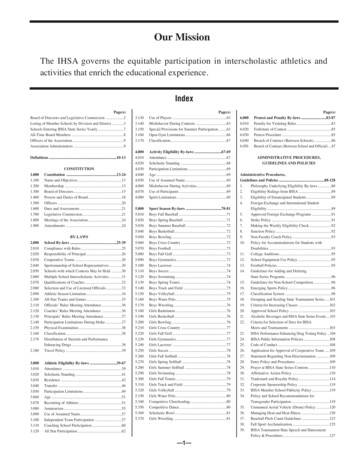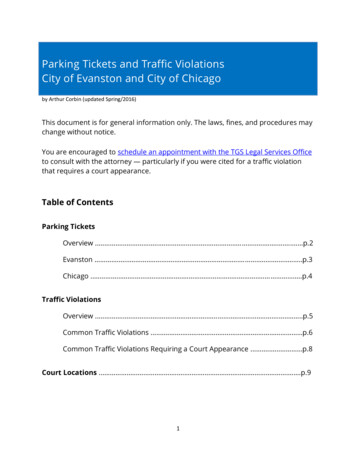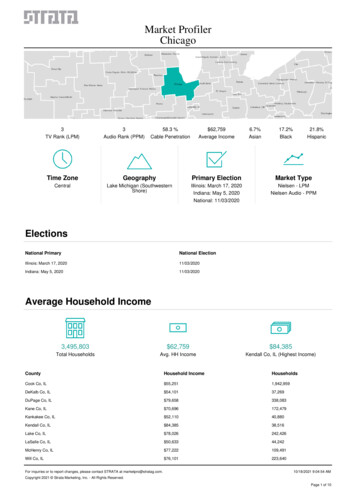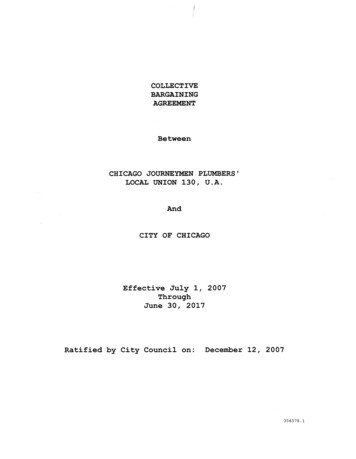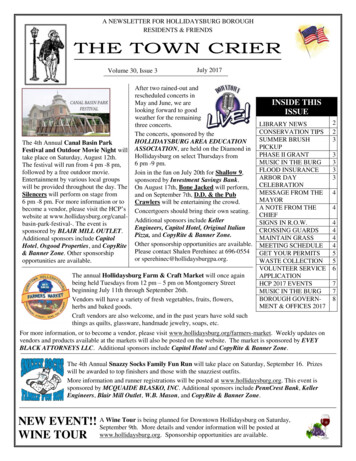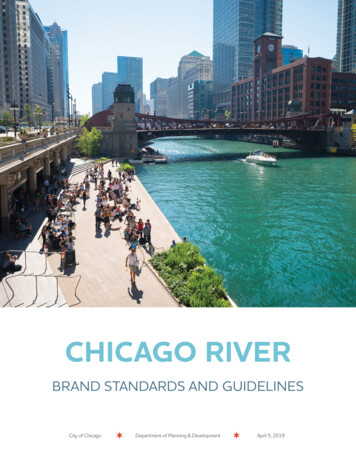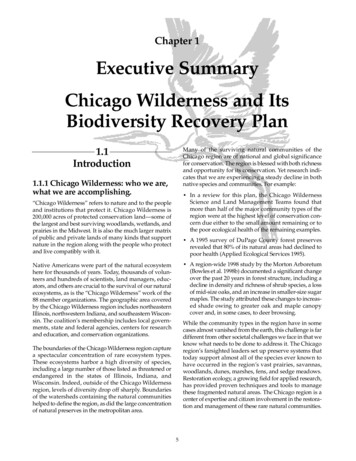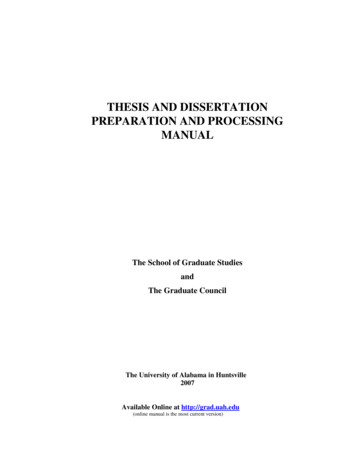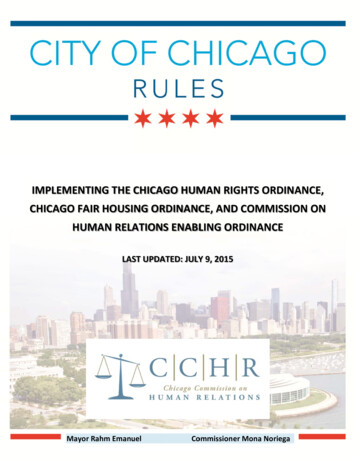
Transcription
IIMPLEMMENTINNG THE CHICAGGO HUMMAN RIGHTS OORDINAANCE,CCHICAGO FAIR HOUSING ORDDINANCCE, ANDD COMMMISSIOON ONHUMAAN RELAATIONSS ENABLLING ORRDINANNCELASST UPDATTED: JULYY 9, 201551Mayor Rahm EmanuuelCoommissioner Mona NNoriega
BY AUTHHORITY VESTED IN THHE CHAIRMAAN AND COOMMISSIONEER OF THE COMMISSIOONON HUMMAN RELATIIONS PURSUUANT TO 2-120-510 (p), THE FOLLOOWING RULLES REGARDDINGCHICAGO COMMISSSION ON HUUMAN RELAATIONS AREE ADOPTEDD HEREIN.By Order of the Commmissioner:Signed:CommissionerCr Mona NorieggaDatee: July 30, 2015Publishedd: July 9, 20155Effective:: July 9, 201552
TABLE OF CONTENTSPART 100 GENERAL DEFINITIONS11PART 200 PROCEDURAL REQUIREMENTS15SUBPART 210. Pleadings15Section 210.100 ComplaintsRule 210.110 General JurisdictionRule 210.120 Filing of ComplaintRule 210.122 Treatment of Adequate and Defective ComplaintsRule 210.125 Failure to Provide Information Adequate to EnableServiceRule 210.127 Complainant Obligations to CooperateRule 210.130 Commission-Initiated ComplaintsRule 210.140 Service of ComplaintRule 210.145 Amendment to Cure Technical Defects or OmissionsRule 210.150 Amendment of Claims or AllegationsRule 210.160 Amendment to Add or Substitute PartiesRule 210.170 Class ActionsRule 210.180 ConsolidationRule 210.190 Voluntary Withdrawal of ComplaintRule 210.195 No Action Possible Against Respondent1717171718181921212122Section 210.200 Responses to ComplaintsRule 210.210 Notice of Response RequirementsRule 210.220 Deadline to RespondRule 210.230 Extension of Time to RespondRule 210.240 Form of CertificationRule 210.250 Form and Content of ResponseRule 210.260 Failure to RespondRule 210.270 Respondent ObligationsRule 210.280 Counterclaims222222222223232424Section 210.290 Complainant Reply and Supporting DocumentationRule 210.292 Complainant Opportunity to ReplyRule 210.294 Deadline for Complainant’s Supporting DocumentationRule 210.296 Extension of Time to Reply or Submit SupportingDocumentationRule 210.298 Failure to Reply or Submit Supporting Documentation242425Section 210.300 Motions and BriefingRule 210.310 General Rules for Motions25253151515162525
Rule 210.320 Motions for Extension of Time or ContinuanceRule 210.330 Motions to DismissRule 210.340 Motions for Summary JudgmentRule 210.350 Commission-Initiated BriefingSection 210.400 Frivolous Pleadings or RepresentationsRule 210.410 Effect of Submissions to CommissionRule 210.420 Penalties for Frivolous Pleadings or RepresentationsSubpart 220. Investigation and Subpoena Procedures2526262626262727Section 220.100 Investigation ProcessRule 220.110 Description of InvestigationRule 220.120 Investigative Orders to PartiesRule 220.130 Continuing Obligation to Provide Relevant InformationSection 220.200 Subpoena ProceduresRule 220.210 Issuance of a SubpoenaRule 220.220 Manner of ServiceRule 220.230 Objections to Issued SubpoenasRule 220.240 Failure to Comply with Subpoena272727292929303031Section 220.300 Substantial Evidence and Other DeterminationsRule 220.310 Determination as to Substantial EvidenceRule 220.320 Decision ProcessRule 220.330 Dispositive Orders32323233Section 220.400 Access to Investigative FilesRule 220.410 Access to FilesRule 220.420 Access by Governmental Agencies333334Subpart 230. Settlement34Rule 230.100 Settlement Policy and Settlement ConferenceRule 230.110 Settlement Conference ProcedureRule 230.120 Nondisclosure of Settlement DiscussionsRule 230.130 Closure of a Case by SettlementRule 230.140 Noncompliance with Approved Settlement AgreementSubpart 235 Sanctions for Procedural ViolationsSection 235.100 Sanction ProceduresRule 235.110 Sanctions GenerallyRule 235.120 Notice RequirementsRule 235.130 Procedure after Notice of Potential Sanctions434353535363636363637
Rule 23.5140 Order Imposing SanctionRule 235.150 Motion to Vacate or Modify Sanction3737Section 235.200 Dismissal for Failure to CooperateRule 235.210 Grounds for DismissalRule 235.220 Other Dismissal Grounds and Procedures383838Section 235.300 DefaultRule 235.310 Grounds for DefaultRule 235.320 Effect of Default383839Section 235.400 Monetary SanctionsRule 235.410 Monetary Sanctions GenerallyRule 235.420 FinesRule 235.430 Costs to a PartyRule 235.440 Monetary Sanctions on AttorneysRule 235.450 Recovery from Other Payments in Case393939394040Subpart 240. Administrative Hearings40Section 240.100 Notice and Pre-Hearing ProceduresRule 240.110 Notice of Commencement of Hearing ProcessRule 240.115 Scheduling of ProceedingsRule 240.120 Pre-Hearing ConferencesRule 240.130 Pre-Hearing Memorandum4040404041Section 240.200 Disqualification of a Hearing officerRule 240.210 Motions to DisqualifyRule 240.220 Interlocutory Review of Decision Not to Disqualify424242Section 240.300 Hearing ProcessRule 240.307 Powers and Duties of Hearing officerRule 240.314 Rights of Parties and Rules of EvidenceRule 240.321 Ex Parte CommunicationsRule 240.328 BriefingRule 240.335 PrivilegesRule 240.342 StipulationsRule 240.349 Motions, Objections, and OrdersRule 240.363 Waiver of Objections and ArgumentsRule 240.370 Commission Employees as WitnessesRule 240.398 Penalties for Failure to Appear at Hearing4242434343434344444445Section 240.400 DiscoveryRule 240.407 Request for Documents45455
Rule 240.435 Additional DiscoveryRule 240.442 Duty to SupplementRule 240.456 Motions to CompelRule 240.463 Sanctions for Failure to ComplySection 240.500 Record of HearingRule 240.510 Official RecordRule 240.520 Sealing RecordRule 240.530 Transcript4546464646464748Section 240.600 Decisions After Hearing48Rule 240.610 Recommended Ruling on Liability and Relief48Rule 240.620 Board of Commissioners Decision on Liability and Relief 49Rule 240.630 Determination of Attorney Fees and Costs49Rule 240.640 Supplemental Attorney Fees and Costs after Court Review 50Section 240.700 Pre- and Post-Judgment InterestSubpart 250. Review and Compliance5051Section 250.100 ReviewRule 250.110 Review of DismissalsRule 250.120 Other ReviewRule 250.130 Content and Grounds for ReviewRule 250.140 Grant or Denial of Request for ReviewRule 250.150 Appeal of a Final order515151515152Section 250.200 Compliance with Final OrdersRule 250.210 Duty to ComplyRule 250.220 Enforcement of Final orders525252Subpart 260. Commission Rule-MakingRule 260.100 Construction of Rules and RegulationsRule 260.110 Superseding of Rules and RegulationsRule 260.120 Amendment of RegulationsRule 260.130 Availability of RegulationsRule 260.140 Petition for Rule-MakingRule 260.150 SeparabilityRule 260.160 Effect of Intergovernmental Agreements5252525353535353Subpart 270. General Procedures53Section 270.100 Timing and DeadlinesRule 270.110 Computation of Time65353
Rule 270.120 Expedited ProceedingsRule 270.140 Commission Deadlines5354Section 270.200 Service and FilingRule 270.210 Service of DocumentsRule 270.220 Filing with the CommissionRule 270.230 Service and Filing by Electronic Mail54545455Section 270.300 Representation of PartiesRule 270.310 Attorney AppearanceRule 270.320 Supervised Senior Law Students or GraduatesRule 270.330 Attorney Licensed Out of StateRule 270.340 Withdrawal of Attorney Appearance5555555656Section 270.400 Interpreters and AccessibilityRule 270.410 InterpretersRule 270.420 Accessibility565657Section 270.500 PrecedentRule 270.510 Applicable PrecedentRule 270.520 Citation FormRule 270.530 Publication and Copies of Decisions57575757Section 270.600 Waiver of Commission Fees58PART 300 EMPLOYMENT DISCRIMINATIONSubpart 305. Bona Fide Occupational QualificationsRule 305.100 Bona Fide Occupational QualificationsRule 305.110 Examples of BFOQs59595959Subpart 310. Employment AgenciesRule 310.100 Prohibition of Discrimination by Employment AgenciesRule 310.110 Restriction of Listings596060Subpart 315. Advertising of Job OpportunitiesRule 315.100 Discriminatory Advertising6060Subpart 320. Pre-Employment InquiriesRule 320.100 Discriminatory Pre-Employment InquiriesRule 320.110 Citizenship and Similar InquiriesRule 320.120 Inquiries into Applicant’s Criminal Historyand Criminal Record606060Subpart 325. Compensation61761
Rule 325.100 Discriminatory Compensation61Subpart 330. Fringe BenefitsRule 330.100 Definition of “Fringe Benefits"Rule 330.110 Prohibition of DiscriminationRule 330.120 Cost Not a DefenseRule 330.130 Memberships in ClubsRule 330.140 Pension or Retirement Plan626262626262Subpart 335. Policies Relating To Pregnancy and ChildbirthRule 335.100 Prohibition of DiscriminationRule 335.110 Disabilities Caused by Pregnancy or ChildbirthRule 335.120 Temporary DisabilitiesRule 335.130 Non-Disability Leaves6262626363Subpart 340. Sexual HarassmentRule 340.100 Totality of CircumstancesRule 340.110 Liability for Supervisors’ ActionsRule 340.120 Liability for Actions of Non-Managerial PersonnelRule 340.130 Benefits withheld from Others6363636363Subpart 345. Harassment (Other Than Sexual Harassment)Rule 345.100 Prohibition of HarassmentRule 345.110 Definition of HarassmentRule 345.120 Liability for Supervisors’ ActionsRule 345.130 Liability for Actions of Non-Managerial Personnel6464646464Subpart 350. Discrimination Based on National OriginRule 350.100 Citizenship RequirementsRule 350.110 Speak-English-only Rules646465Subpart 355. Discrimination Based on ReligionRule 355.100 Reasonable AccommodationRule 355.110 Alternatives for Accommodating Religious PracticesRule 355.120 Attendance and Seniority RightsRule 355.130 Inquiries Regarding Applicant Availability6565666667Subpart 360 Discrimination Based on Military Discharge StatusRule 360.100 Determination of Discharge StatusRule 360.110 Exemption for Fiduciary Responsibilities676767Subpart 365 Discrimination Based on DisabilityRule 365.10.0 DefinitionsRule 365.110 Discriminatory Acts6767688
Rule 365.120 Danger to Health or SafetyRule 365.130 Reasonable AccommodationRule 365.140 Undue HardshipRule 365.150 Pre-Employment Inquiries and ExaminationsRule 365.160 Employment Inquiries and ExaminationsRule 365.170 StandardsSubpart 370 ExemptionsPART 400 HOUSING DISCRIMINATION6869697070707172Subpart 410 Definitions72Subpart 420 Discriminatory ActsRule 420.100 Terms and ConditionsRule 420.105 Pre-Rental or Pre-Sale InquiriesRule 420.110 SteeringRule 420.120 Circulation of Discriminatory CommunicationsRule 420.130 Refusal to Sell, Lease or RentRule 420.140 Discrimination in FinancingRule 420.150 Blockbusting/Panic Peddling and Encouragement ofBlockbusting/Panic PeddlingRule 420.160 Refusal of Examination of ListingsRule 420.170 Sexual HarassmentRule 420.175 Harassment (Other Than Sexual Harassment)Rule 420.180 Discrimination Against Persons with DisabilitiesRule 420.190 Standards73737474747676777778787880Subpart 430 Exemptions80PART 500 DISCRIMINATION IN PLACES OF PUBLIC ACCOMMODATION81Subpart 510 Definition of a Public AccommodationRule 510.100 Interpretation of ordinanceRule 510.110 Examples of Public Accommodations818181Subpart 520 Discriminatory ActsRule 520.100 Prohibition of Discriminatory ConductRule 520.105 Accommodation of Persons with DisabilitiesRule 520.110 Definition of “Full Use"Rule 520.120 Definition of “Reasonable Accommodation"Rule 520.130 Definition of “Undue Hardship"Rule 520.140 Sexual HarassmentRule 520.150 Harassment (Other Than Sexual Harassment)82828282828283839
Subpart 530 Exemptions84Subpart 540 Standards84Subpart 550 Other Laws8410
PART 100 GENERAL DEFINITIONSDefinitions which include a citation to the Chicago Municipal Code are taken from the applicableordinance. Allother definitions originate in these regulations.(1) “Age” means chronological age of not less than 40 years. Chicago Muni. Code § 2-160-020(a).(2) “Board of Commissioners” means that body established by Section 2-120-490 of the MunicipalCode of Chicago.(3) “Commencement of the Hearing Process” means the issuance of an order appointing a hearingofficer to conduct an administrative hearing.(4) “Commission” means one or more of the staff responsible for the day-to-day operations of theCommission on Human Relations, including the Chair/Commissioner.(5) “Complainant” means any person, including the Commission, that files a complaint with theCommission.(6) “Complaint” means a sworn statement filed with the Commission either on the form provided for thispurpose by the Commission or on a form that is its substantial equivalent, which alleges an ordinanceviolation and which includes the information required by Rule 210.120(c).(7) “Conciliation” or “Mediation” is a process calling for parties to work together with the aid of aneutral facilitator – a conciliator or mediator – who assists them in reaching a settlement. The conciliatoror mediator’s role is advisory and non-binding, as the resolution of the dispute rests with the partiesthemselves. Where used, “conciliation” and “mediation” have the same meaning.(8) “Conciliator” or “Mediator” means a person designated by the Commission to conduct a settlementconference or otherwise attempt to secure a voluntary settlement, but who does not participate in theinvestigation, serve as hearing officer, or in any other respect participate in the adjudication of the samecase. Where used, “conciliator” and “mediator” have the same meaning.(9) “Credit history” means a record of an individual’s past borrowing and repaying, includinginformation about late payments and bankruptcy.(10) “Credit report” means any written or other communication of any information by a consumerreporting agency that bears on a consumer’s creditworthiness, credit standing, credit capacity, or credithistory.(11) “Credit Transaction” means the grant, denial, extension, or termination of credit to an individual.Chicago Muni. Code § 2-160-020(b).(12) “Criminal History” means a Criminal Record, and/or records of any arrest or information that aperson has been questioned, apprehended, arrested, taken into custody or detention, held for investigation,11
charged with, indicted, or prosecuted, for any criminal offense by any law enforcement agency, militaryauthority, or tribunal, irrespective of whether any formal charges were ever brought against the person.(13) “Criminal Record” means any information indicating that a person has been convicted of anyfelony, misdemeanor or other criminal offense, has been judged delinquent, or has been placed onprobation, imprisoned or paroled by any law enforcement agency, military authority, or tribunal.(14) “Defective Complaint” means a document filed with the Commission which appears to be intendedas a complaint but which does not substantially meet the requirements of Rule 210.120 and so is treatedpursuant to Rule 210.122(a).(15) “Disability” means (i) a determinable physical or mental characteristic which may result fromdisease, injury, congenital condition of birth, or functional disorder including but not limited to adeterminable physical characteristic which necessitates a person’s use of a guide, hearing, or support dog;or (ii) the history of such a characteristic; or (iii) the perception of such a characteristic by the personcomplained against. Chicago Muni. Code § 2-160-020(c).(16) “Employee” means an individual who is engaged to work in the City of Chicago for or under thedirection and control of another for monetary or other valuable consideration. Chicago Muni. Code § 2160-020(d). (17) “Employer” means any “person,” as defined in these regulations, employing one ormore employees.(18) “Employment Agency” means a person that undertakes to procure employees or opportunities towork for potential employees, either through interviews, referrals, advertising, or through anycombination thereof. Chicago Muni. Code, § 2-160-020(e).(19) “Final Order” means (i) an order dismissing a complaint if no request for review is filed within thetime period provided in Rule 250.110, (ii) a ruling on a request for review filed after an order dismissing acomplaint, or (iii) the later of a Board of Commissioners ruling on liability after an administrative hearingor a Board of Commissioners ruling on attorney fees and costs, if any.(20) “Gender Identity” means the actual or perceived appearance, expression, identity, or behavior of aperson as being male or female, whether or not that appearance, expression, identity, or behavior isdifferent from that traditionally associated with the person’s designated sex at birth. Chicago Muni. Code§ 2-160-020(f).(21) “Hearing Officer” or “Administrative Hearing Officer” means any attorney duly licensed by theState of Illinois who is designated by the Commission to conduct an administrative hearing.(22) “Labor Organization” means any organization, agency or employee representation committee,group, association or plan in which employees participate and which exists for the purpose, in whole or inpart, of dealing with employers concerning grievances, labor disputes, wages, rates of pay, hours, or otherterms or conditions of employment.(23) “Marital Status” means the legal status of being single, married, divorced, separated, or widowed.Chicago Muni. Code § 2-160-020(g).12
(24) “Membership in one of the Protected Classes” means that a person is or has, or is perceived to beor have, one or more of the following: a particular race, color, sex, gender identity, age, religion,disability, national origin, ancestry, sexual orientation, marital status, parental status, military dischargestatus, source of income, credit history (as to employment only), or criminal history (as to employmentonly).(25) “Military Discharge Status” means the fact of discharge from military status and the reasons forsuch discharge. Chicago Muni. Code § 2-160-020(h).(26) “National Origin” means the place in which a person or one of his or her ancestors was born. Beingof a particular national origin means that a person has or is perceived to have the physical, cultural, orlinguistic characteristics of a particular national origin group.(27) “Ordinance” means one or more of the Chicago Human Rights Ordinance, Chicago Muni. Code Ch.2- 160-010 et seq. (sometimes referred to herein as “HRO”); the Chicago Fair Housing Ordinance,Chicago Muni. Code Ch. 5-8-010 et seq. (sometimes referred to herein as “FHO”); and/or the EnablingOrdinance establishing the Chicago Commission on Human Relations, Chicago Muni. Code § 2-120-480et seq.(28) “Parental Status” means the status of living with one or more dependent minor or disabled children.Chicago Muni. Code § 2-160-020(i).(29) “Party” means either a complainant or a respondent.(30) “Person” means, but is not limited, to, one or more individuals, corporations, partnerships, politicalsubdivisions, municipal corporations or other governmental units or agencies, associations, labororganizations, joint apprenticeship programs, legal representatives, mutual companies, joint stockcompanies, trusts, unincorporated organizations, trustees in cases under Title 11 of the United StatesCode, receivers, trustees or other fiduciaries, and any successors or assigns thereof.(31) “Protected Class” means one or more of the following: race, color, sex, gender identity, age,religion, disability, national origin, ancestry, sexual orientation, marital status, parental status, militarydischarge status, or source of income, credit history (employment only), criminal history (employmentonly).(32) “Public Accommodation” means a place, business establishment, or agency that sells, leases,provides, or offers any product, facility, or service to the general public, regardless of ownership oroperation (i) by a public body or agency, (ii) for or without regard to profit, or (iii) for a fee or not for afee. An institution, club, association or other place of accommodation which has more than 400 membersand provides regular meal service and regularly receives payment for dues, fees, accommodations,facilities, or services from or on behalf of non-members for the furtherance of trade or business shall beconsidered a place of public accommodation. Chicago Muni. Code § 2-160- 020(j).(33) “Religion” means all aspects of religious observance and practice, as well as belief, except that withrespect to employers “religion” has the meaning ascribed to it in Section 2-160-050 of the MunicipalCode of Chicago. Chicago Muni. Code § 2-160-020(k).13
(34) “Respondent” means any “person,” as defined herein, alleged by a complainant to have committedan ordinance violation.(35) “Sex” means the status of being male or female.(36) “Sexual Harassment” means any unwelcome sexual advances or requests for sexual favors orconduct of a sexual nature when (i) submission to such conduct is made either explicitly or implicitly aterm or condition of an individual’s employment, or (ii) submission to or rejection of such conduct by anindividual is used as the basis for any employment decision affecting the individual, or (iii) such conducthas the purpose or effect of substantially interfering with an individual’s work performance or creating anintimidating, hostile, or offensive working environment. Chicago Muni. Code § 2-160-010(m); see alsoSubpart 340.100, Rule 420.170, and Rule 520.140. Chicago Muni. Code § 2-160-020(m).(37) “Sexual Orientation” means the actual or perceived state of heterosexuality, homosexuality, orbisexuality. Chicago Muni. Code § 2-160-020(l).(38) “Source of Income” means the lawful manner by which an individual supports himself or herselfand his or her dependents. Chicago Muni. Code § 2-160-020(n).(39) “Violation” or “Ordinance Violation” means one or more acts prohibited by the Chicago HumanRights Ordinance or the Chicago Fair Housing Ordinance.14
PART 200 PROCEDURAL REQUIREMENTSSUBPART 210 PLEADINGSSection 210.100 ComplaintsRule 210.110 General JurisdictionAny person, including persons not able to work lawfully in the United States, may file a complaint withthe Commission if the complaint alleges an ordinance violation, if the alleged violation occurred withinthe City of Chicago, and if the complaint is filed no later than 180 days after the occurrence of the allegedviolation. A complaint must meet all other jurisdictional requirements set by ordinance, these regulations,Commission decisions, and court rulings.Rule 210.120 Filing of Complaint(a) Time for FilingA complaint must be received by the Commission no later than 180 days after the date of the occurrenceof the alleged ordinance violation. If the alleged violation is of a continuing nature, the date of occurrencemay be any date subsequent to the commencement of the violation, up to and including the date on whichit may have ceased.(b) Filing ProcessA complaint may be filed by personal delivery, mail, e-mail or facsimile. A filing by facsimile orelectronic mail shall not be deemed complete until an original in paper form is received. A complaint isdeemed filed upon receipt by the Commission at its place of business during its business hours.(c) Complaint ContentA complaint must contain the following information to the best of the complainant’s knowledge,information, and belief:(1) Name, mailing address, and telephone number of the complainant.(2) Identification of each individual or business respondent accused of the alleged ordinance violation. Ifthe full or correct name is not known, the complaint must provide a title or other designation whichidentifies the respondent, such as “Owner of 1234 Main Street” or “President of ABC Company."(3) The address of each respondent sufficient to enable the Commission to effect service by mail, and thetelephone number, if known.(4) A description of the conduct, policy, or practice alleged to constitute the ordinance violation, in suchdetail as to substantially apprise the respondent(s) and the Commission of the timing, location(s), andfacts of the alleged violation as well as the basis or bases of discrimination.(d) Form15
A complaint must be in writing and comprehensible, using the Commission’s form or a substantialequivalent. Documentation in support of the complaint may be submitted at the time of filing but will notbe treated as part of the complaint. A complaint shall not exceed five pages without leave of theCommission.(e) OathThe complainant must sign the complaint under oath, using the following oath or one that is substantiallyequivalent: “I swear or affirm that I have read this complaint and that it is true and correct to the best ofmy knowledge, information, and belief.” Notarization is not required.(f) Request for ReliefComplainants are not required to specify the relief requested at the time of filing. A request in a complaintfor certain types or amounts of relief shall not be deemed a waiver of any other relief.(g) Effect of Filing on Other ClaimsFiling of a complaint or the failure to file a complaint with the Commission does not bar any person fromseeking any other remedy provided by law except that, in certain instances, one or moreintergovernmental agreements may specify the governmental agency or court before which a person maypursue the complaint.Rule 210.122 Treatment of Adequate and Defective Complaints(a) Notice of Defective ComplaintIf the Commission receives a document which does not substantially meet the requirements of Rule210.120, the Commission shall record the date of filing on the face of the document but shall not docket itas a complaint or proceed to investigate it. Instead, the Commission shall mail to the person submittingthe document a notice stating the defect or omission which must be corrected. The notice shall explainthat the submitted document has not been accepted as a complaint, that it is the person’s responsibility tofile an adequate complaint no later than 180 days after the occurrence of the alleged ordinance violation,and that failure to file an adequate and timely complaint means that the person cannot proceed before theCommission with any claims stated in the document. The Commission may attempt to telephone orotherwise assist the person submitting the document but is not required to do so. Neither the submissionof a defective complaint nor any attempt by the Commission to contact or assist a person seeking to file acomplaint shall toll the 180 day filing deadline or relieve the person of responsibility to file an adequatecomplaint. The Commission is not required to retain any defective complaint or accompanying materialsfor more than 180 days.(b) Docketing of Substantially Adequate ComplaintsWhen the Commission receives a document which substantially meets the requirements of Rule 210.120,the Commission shall docket it as a complaint by recording the date of filing and assigning a casenumber, shall serve it on the respondent(s) as set forth in Regs. 210.140 and 210.210, and in otherrespects shall initiate the investigation process.16
Rule 210.125 Failure to Provide Information Adequate to Enable ServiceIf the name (or other identifier) and address of any respondent which was provided in a complaint provesinadequate to enable the Commission to serve the complaint on the respondent, the Commission shall firstdetermine whether the error is readily identifiable and readily correctable (such as an incorrect zip code),and if so shall re-serve the complaint using the correct information and treat the error as a technical defector omission under Rule 210.145.If the Commission determines that the error is not readily identifiable and readily correctable, theCommission shall issue a notice of potential dismissal which informs the complainant of the nature of theinadequacy, explains that the complainant must amend the complaint with information sufficient to enableservice, and warns that failure to so amend the complaint shall lead to dismissal as to any respondent whocannot be served. The notice shall allow at least 14 days from the date of mailing to amend the complaint.If the complainant amends the complaint to enable service, the amendment shall relate back to theoriginal filing date and the Commission shall serve the initial and amended complaint as set forth in Rule210.140, allowing 28 days to respond. If the complainant does not respond to the notice or does notamend the complaint with information sufficient to enable service, the Commission shall dismiss thecomplaint as to any respondent that cannot be served.Rule 210.127 Complainant’s Obligations to CooperateA complainant with a pending case must promptly notify the Commission of any change of address orprovide a temporary address during any prolonged absence from a current address. A complainant isrequired to participate in the Commission’s processing of the case and to provide the Commission withinformation needed in order for the case to proceed. A complainant must be available for any interviews,conferences, meetings, and administrative hearing on reasonable notice. Failure to cooperate with theseand other regulations, notices, or orders may lead to dismissal of the complaint pursuant to Rule 235.210.To the extent that complainant cooperation requirements and dismissal procedures stated in otherregulations differ from those stated in this regulation, the more specific provision shall apply.Rule 210.130 Commission-Initiated ComplaintsWhen the Commission has reason to believe that any person has violated the ordinance, the Commissionmay itself initiate a complaint. The Commission shall have sole discretion to determine what complaintsit shall or shall not initiate. The Commission may use testers to obtain information to determine whetheror not to file a complaint as well as any other investigative method permitted by ordinance. ACommission initiated complaint shall be signed by any staff member authorized to do so by theChair/Commissioner and shall meet the content requirements set forth in Rule 210.120. Any staff memberwho signs a complaint on behalf of the Commission shall not participate in any determination concerningthat case including whether there is substantial evidence of an ordinance violation.Rule 210.140 Service of ComplaintWithin 10 days of filing, the Commission shall serve on each respondent a copy of any complaint oramended complaint file
Rule 210.230 Extension of Time to Respond 22 Rule 210.240 Form of Certification 22 Rule 210.250 Form and Content of Response 23 Rule 210.260 Failure to Respond 23 . Rule 355.120 Attendance and Seniority Rights 66 Rule 355.130 Inquiries Regarding Applicant Availability 67 Subpart 360 Discrimination Based on Military Discharge Status 67 .
